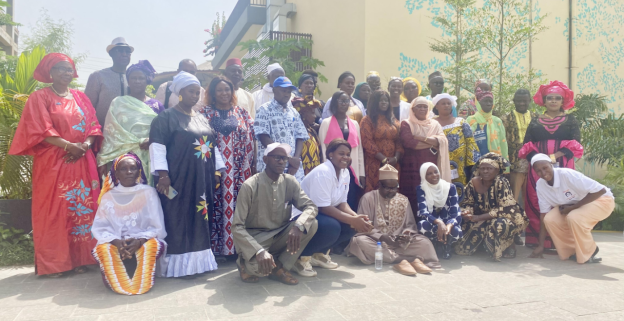By Mustapha Jallow
Senior staff of the Gambia Committee on Traditional Practices (GAMCOTRAP) and stakeholders on Thursday commenced an engagement on the effective implementation of the anti-FGM legislation following calls by some religious leaders and members of the National Assembly to repeal the law.
The legislation criminalises Female Genital Mutilation (FGM) in The Gambia. The long-day policy dialogue focused on enabling stakeholders to discuss the importance of upholding the Law to protect the girl-child. It is also part of the group’s strategic priorities to ensure those cutting the girls are punished.
The consultative session, held at a local hotel in Kololi, brought together diplomats from UN, EU, representatives of human right organisations (HROs), Government officials, lawyers, National Assembly Members (NAMs), district chiefs, council of elders, ex-circumcisers and members of the civil society organisation (CSOs).
Supported by Equality Now, this initiative, according to the organisers, is in response to recent attempts by some members of the National Assembly to repeal the law banning FGM, particularly in light of a recent court ruling that found two women and the circumciser guilty of breaking the law.
Few months ago, the subject of removing FGM-law was a hot cake in the country, where politicians, religious leaders, advocacy groups and other NGOs engaged in war of words regarding the practice of FGM.
GAMCORAP and its key partners said they still stand firm to ensure children are protected by the law from these harmful practices and all forms of violence against them.
Dr. IsatouTouray, the Executive Director of GAMCOTRAP, said the law banning FGM stands as a beacon of hope, illuminating the path towards a future where every girl child can grow up free from the shadows of fear and pain. She added that it represents not just legislation but a pledge to safeguard the female child. Upholding this law, she said, is their collective promise to the girl child and an affirmation that her rights are non-negotiable, her dignity inviolable, and her future is limitless.
“Yet, we are acutely aware of the challenges that lie ahead. Tradition, deeply ingrained in the social fabric, often resists change. Overcoming these entrenched beliefs requires not just legal measures but a comprehensive societal transformation. It demands open dialogue, education and compassion,’’ DrTouray said.
To succeed, she stated: “We must engage in a multi-faceted approach. Education, both formal and informal, is our most important vehicle for behavioural change and development. We must educate parents, community leaders, and young people about the physical and psychological ramifications of FGM. This has happened over the years resulting in a call to enact a law by the population. Knowledge is our weapon in dispelling myths and fostering understanding. It is the power of knowledge that brought about the Law. This occasion is about upholding the law to protect the girl child from FGM.’’
“We must encourage using their platforms to challenge harmful practices and advocate for the well-being of our girls. All of us have a role to play in this enlightenment process. Together, we can amplify our voices and efforts, ensuring that the message of empowerment and protection reaches every corner of our nation, reaching out to various target groups and offering them pathways to healing and advocacy for victims while we ensure that never again any girl-child will be cut,’’ the advocacy leader said.
Dr. Touray went further to thank all of their partners for the great efforts made to promote the sexual and reproductive health and rights of women, girls and differently-able persons. She thanked the Equality Now for funding the event.
Speaking of behalf of the health minister, Musa Camara – the regional health director calls for the protection and nurturing of sexual and reproductive health rights of women and girls for improved health and wellbeing.
He outlined the health effects of FGM which include but not limited to loss of blood due to severe bleeding, postpartum haemorrhage, infections (contaminated instruments) used by practitioners, and complications during child birth with increased tendencies of new-born deaths.
“The above health risks of FGM and many others not mentioned have direct impact on health and wellbeing of women and girls thereby leading to low productivity and consequently impact negatively on the already stretched economy,’’ Camara warned.
Neneh Touray, deputy director for the Directorate of Gender Equality and Women Empowerment also spoke on behalf of minister for women said it is important to mobilise communities, particularly where FGM is highly prevalent and leverage participatory governance structures to adopt and implement by laws.
While engaging community, she called on the traditional and religious leaders, parents and all others to report and tracking cases of FGM and enjoined them to disassociate from all forms of FGM. He stated that this ensures communities are responsive and integrate girls and women priorities in action at this level.
Representing GAMCOTRAP Chair, OusmanTouray, a board member said FGM is a deeply rooted tradition. He added that they gathered to reaffirm their commitment to protect girls, ensure their safety, health and dignity.
“The FGM law in The Gambia represents a significant milestone, reflecting our collective determination to end this harmful practice. Therefore, upholding this law is not merely a legal obligation and a moral imperative, but rather recognizing the fundamental human rights of our children, allowing them to grow up free from the physical and emotional scars of FGM,’’ NenehTouray said.


















